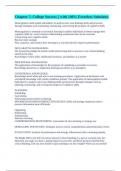Chapter 7: College Success || with 100% Errorless Solutions.
Metacognitive skills enable individual's to analyze one's own thinking skills and processes
through strategies such as planning, monitoring, and revising the progress of cognitive skills.
Metacognition is essential to successful learning It enables individuals to better manage their
cognitive skills by: correct answers Determining weaknesses that can be corrected
Constructing new cognitive skills
Become more strategic
Plan, sequence, and monitor their learning in a way that directly improves performance
DECLARATIVE KNOWLEDGE:
The factual knowledge the learner needs before being able to process or use critical thinking
related to the topic
Knowledge of one's skills, intellectual resources, and abilities as a learner
PROCEDURAL KNOWLEDGE:
The application of knowledge for the purposes of completing a procedure or process
Knowledge about how to implement learning procedures (e.g. strategies)
CONDITIONAL KNOWLEDGE:
Knowledge about when and why to use learning procedures. Application of declarative and
procedural knowledge with certain conditions present. The application of metacognition enable
individual's to analyze one's own thinking skills and processes through strategies such as
planning, monitoring, and revising the progress of cognitive skills.
PLANNING:
Scheduling
Goal setting
Allocating resources prior to learning
INFORMATION MANAGEMENT STRATEGIES: Skills and strategy sequences used to
process information more efficiently.
Organizing
Elaborating
Summarizing
Selective focusing
COMPREHENSION MONITORING: Assessment of one's learning or strategy use.
DEBUGGING STRATEGIES: Strategies used to correct comprehension and performance errors.
EVALUATION: Analysis of performance and strategy effectiveness after a learning episode.
The Bright IDEA! (I.I.D.E.A) correct answers Critical thinking is a part of everyday life, too.
Decisions you make can have a lasting impact on your life, and these decisions benefit from
critical thinking. Did you ever decide to quit smoking or to lose weight? Were you successful?
, How did you decide to attend the college you are in? Was that the right choice for you? In any of
these cases, could you have made a better decision if you had better or more information?
Critical Thinking as an active, self-reflective, and deliberate attempt to utilize cognitive skills to
support decision making, problem solving, or mastery of concepts throughout various contexts.
Critical thinking involves the following five reasoning skills:
1. Inference - Inference skills enable people to draw conclusions from reasons and evidence.
Inference is used when someone offers thoughtful suggestions and hypothesis. Inference skills
indicate the necessary or the very probable consequences of a given set of facts and conditions.
Conclusions, hypotheses, recommendations or decisions that are based on faulty analysis,
misinformation, bad data or biased evaluations can turn out to be mistaken, even if they have
reached using excellent inference skills.
2. Induction - Decision making in contexts of uncertainty relies on inductive reasoning. We use
inductive reasoning skills when we draw inferences about what we think is probably true based
on analogies, case studies, prior experience, statistical analysis, simulations, hypotheticals, and
patterns recognized in familiar objects, events, experiences and behaviors. As long as there is the
possibility, however remote, that a highly probable conclusion might be mistaken even though
the evidence at hand is unchanged, the reasoning is inductive. Although it does not yield
certainty, inductive reasoning can provide a confidence basis for solid belief
Metacognition is essential to successful learning. It enables individuals to better manage their
cognitive skills by: correct answers determining weaknesses that can be corrected
constructing new cognitive skills becoming more strategic planning, sequencing, and monitoring
their learning in a way that directly improves performance
PLANNING correct answers Scheduling
Goal setting
Allocating resources prior to learning
INFORMATION MANAGEMENT STRATEGIES correct answers Skills and strategy
sequences used to process information more efficiently
organizing,
elaborating
summarizing
selective focusing
Critical Thinking is defined by GMC's as an correct answers active, self-reflective, and
deliberate attempt to utilize cognitive skills to support decision making, problem solving, or
mastery of concepts throughout various contexts
7.0 Thinking about Thought correct answers Throughout this book, we make the case that
college is really quite different from high school. Sure, the social life is different, and there are
different pressures in college, perhaps a family to support or a job schedule to coordinate with
studies. But the two most fundamental differences involve expectations—the expectation that




